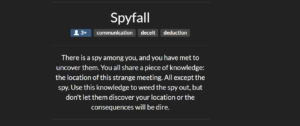Name: Spyfall
Creator: Alexandr Ushan/netgames
Platform: Website
Spyfall was a really fun, open-ended social deception game! I played using the website platform provided in the assignment description, which facilitated the game for me and my friends. The game seemed to have a pretty universal appeal across most ages- I could imagine pre-teens and up playing and enjoying this game. It is definitely targeted towards groups, and it felt most natural in a group of people of relatively similar ages. The game didn’t necessarily seem suited to playing across a large age range, like a ten year old and a 25 year old, as they might ask very different questions and expect very different responses. The synergy of the question game comes from people of a similar situation and knowledge of the world. However, it didn’t necessarily seem that the game was only playable with friends – I think it would be equally fun with strangers, and act as a great icebreaker.
I found the game’s mechanics to be fairly simple, and a little too permissive in the form I played it in. The game provides the spy, randomly chooses a location for the non-spies, and shows a list of possible locations you could be in. The mechanic of question-asking is fun, but the rules were somewhat vague about how it would specifically work, so house rules quickly became established in lieu of an actual rule. In our house rules, we started with one player asking a question to another, and the asked player would become the next asker. I heard from my friends who had played it before that they have played the game where the question-asking responsibility is shifted clockwise, or where it is whoever has a question first. The open-ended nature of the description of this element of the game makes it customizable, but also creates a lot of variance in gameplay.

It’s a fairly classic social deception game, and the simplicity of the game itself allows the social nature to be more prominent. Unlike mafia and WereWolf, it is more conversational than accusatory. I liked that the question-asking allowed players to gather information that wasn’t purely based on vibes or on random accusations and believing someone is ‘acting suspicious’. The round of questions made the conversation about who the spy was much more enjoyable and evidenced, and also more engaging. The mechanic allowing a spy to win if they guess the location also adds a layer of fun – it makes the question answering more challenging, and also engages the spy in doing more than just deceiving the others since they have their own goal in mind. Overall, I liked that the mechanics of the game allowed for a lot of social and mental engagement.
In general, I enjoyed spyfall as a game, and I think it is also one of the more fun social deception games for me. It was incredibly fun, and the mechanics allow for delight in laughing at others answers or reactions and giddiness at successfully getting the spy or guessing the location. If I had to change one thing about the game, I would maybe add a clarification about the question asking mechanic – making house rules is fun, but if I didn’t have friends who had played before it would have been confusing to enter the first round of the game with so little knowledge of what the main component would look like.


